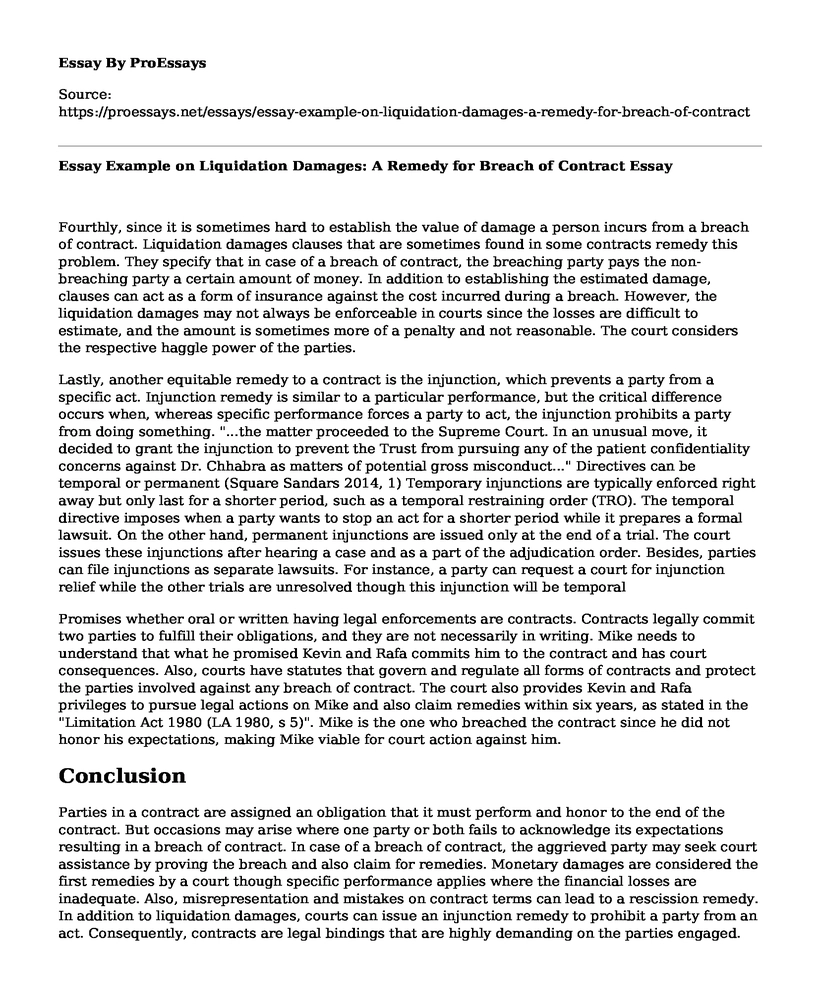Fourthly, since it is sometimes hard to establish the value of damage a person incurs from a breach of contract. Liquidation damages clauses that are sometimes found in some contracts remedy this problem. They specify that in case of a breach of contract, the breaching party pays the non-breaching party a certain amount of money. In addition to establishing the estimated damage, clauses can act as a form of insurance against the cost incurred during a breach. However, the liquidation damages may not always be enforceable in courts since the losses are difficult to estimate, and the amount is sometimes more of a penalty and not reasonable. The court considers the respective haggle power of the parties.
Lastly, another equitable remedy to a contract is the injunction, which prevents a party from a specific act. Injunction remedy is similar to a particular performance, but the critical difference occurs when, whereas specific performance forces a party to act, the injunction prohibits a party from doing something. "...the matter proceeded to the Supreme Court. In an unusual move, it decided to grant the injunction to prevent the Trust from pursuing any of the patient confidentiality concerns against Dr. Chhabra as matters of potential gross misconduct..." Directives can be temporal or permanent (Square Sandars 2014, 1) Temporary injunctions are typically enforced right away but only last for a shorter period, such as a temporal restraining order (TRO). The temporal directive imposes when a party wants to stop an act for a shorter period while it prepares a formal lawsuit. On the other hand, permanent injunctions are issued only at the end of a trial. The court issues these injunctions after hearing a case and as a part of the adjudication order. Besides, parties can file injunctions as separate lawsuits. For instance, a party can request a court for injunction relief while the other trials are unresolved though this injunction will be temporal
Promises whether oral or written having legal enforcements are contracts. Contracts legally commit two parties to fulfill their obligations, and they are not necessarily in writing. Mike needs to understand that what he promised Kevin and Rafa commits him to the contract and has court consequences. Also, courts have statutes that govern and regulate all forms of contracts and protect the parties involved against any breach of contract. The court also provides Kevin and Rafa privileges to pursue legal actions on Mike and also claim remedies within six years, as stated in the "Limitation Act 1980 (LA 1980, s 5)". Mike is the one who breached the contract since he did not honor his expectations, making Mike viable for court action against him.
Conclusion
Parties in a contract are assigned an obligation that it must perform and honor to the end of the contract. But occasions may arise where one party or both fails to acknowledge its expectations resulting in a breach of contract. In case of a breach of contract, the aggrieved party may seek court assistance by proving the breach and also claim for remedies. Monetary damages are considered the first remedies by a court though specific performance applies where the financial losses are inadequate. Also, misrepresentation and mistakes on contract terms can lead to a rescission remedy. In addition to liquidation damages, courts can issue an injunction remedy to prohibit a party from an act. Consequently, contracts are legal bindings that are highly demanding on the parties engaged. Each person entering a contract should be conscious of the obligation roles and honor them to the end of the contract.
References List
Being Specific About Specific Performance (2028). Retrieved from https://discovery.ucl.ac.uk/id/eprint/10061577/1/Davies_Specific%20Performance%20june18.pdf
De Miguel Asensio, P.A., 2014. The Law Applicable to Contractual Obligations: The Rome I Regulation in Comparative Perspective. Retrieved from https://eprints.ucm.es/29672/1/PDeMiguelAsensioContractsEU-China2014.pdf
Eisenberg, T., and Miller, G.P., 2015. Damages versus specific performance: lessons from commercial contracts. Journal of Empirical Legal Studies, 12(1), pp.29-69. Retrieved from https://scholarship.law.cornell.edu/cgi/viewcontent.cgi?article=2760&context=facpub
Goller, D., and Stremitzer, A., 2014. Breach remedies inducing hybrid investments. International Review of Law and Economics, 37, pp.26-38. Retrieved from https://escholarship.org/content/qt7vt8v0db/qt7vt8v0db.pdf
Square Sandars 2014. UK Supreme Court Grants Injunction to Stop Employer Going Ahead with Disciplinary Hearing. https://www.squirepattonboggs.com/~/media/files/insights/publications/2014/03/uk-supreme-court-grants-injunction-to-stop-emplo__/files/uksupremecourtgrantsinjunctiontostopemployergoin__/fileattachment/uksupremecourtgrantsinjunctiontostopemployergoin__.pdf
Cite this page
Essay Example on Liquidation Damages: A Remedy for Breach of Contract. (2023, Jul 21). Retrieved from https://proessays.net/essays/essay-example-on-liquidation-damages-a-remedy-for-breach-of-contract
If you are the original author of this essay and no longer wish to have it published on the ProEssays website, please click below to request its removal:
- Achievements in RN to BSN Program Essay
- Introducing Electronic Health Records to Nurses - Paper Example
- Cognitive Psychology and Dementia: Annotated Bibliography
- Essay Example on Overweight & Weight Loss: A Challenging Issue
- Essay on Healthy Eating Habits: Busy Lifestyles Don't Have to Stop You
- Personal Statement: An Advanced Degree in Primary Care
- Toy Company Expansion: Identifying an Ideal Model for Decision Making - Essay Sample







